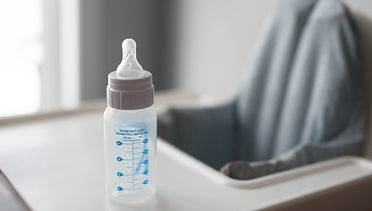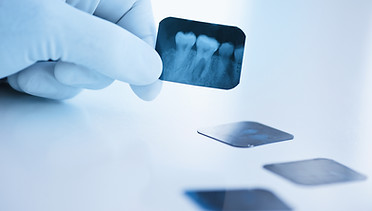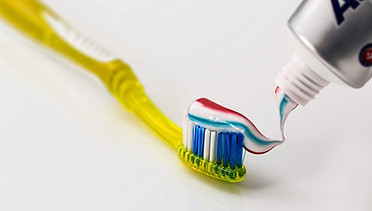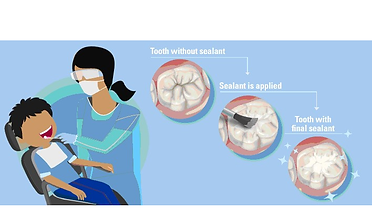

Children
First Dental Visit

The Canadian Dental Association recommends a visit to the dentist when a child is 6 months old, or when the first tooth erupts.
However, in practice it is difficult for parents, the infant and the dentist to make this a reality. At Listowel Family Dental, we recommend that a child be brought for their first appointment at the age of 3.
It is important for your child to experience their first visit in a positive and fun manner, as this initial impression will last a lifetime.
Our dental team will instruct you how to prepare for this and assist you in making your visit easy and fun.
First Tooth

While the arrival of the first tooth depends from baby to baby, generally the first tooth erupts at the age of 6 – 12 months.
Do not be alarmed if your baby does not show any tooth eruption by the age of 1; furthermore, if you are concerned about missing teeth, see our dental professionals for an assessment of your baby’s eruption pattern.
It is not unusual for your baby to be born with a tooth. This will usually be noted at your maternity ward and your dentist will be informed.
Baby Bottle Decay

Dental implants are excellent and predictable long term solutions for a missing tooth, a few missing teeth, or as anchors for dentures (plates). A dental implant is a titanium post that your dental surgeon inserts to replace the root of a missing tooth; with proper healing a tooth can be placed on top of the implant without the need to involve the adjacent teeth (as would done with a traditional bridge treatment).
Our dental surgeons have received extensive training in the field of implant dentistry and bone grafting and continue to expand their surgical expertise by attending seminars, conferences and courses.
Talk to us about dental implants at your next checkup.
Kids & X-rays

Most children do not require x-rays at their first or second visit.
Our dentists recommend the following x-rays:
Regular x-rays that ensure no cavities are present in between your child’s molars (baby or permanent). These films are only prescribed if our dental professionals judge that the back teeth are close to each other.
A panoramic xray shows all the teeth present and developing, as well as the jaws and serve as an excellent screening tool for our dentists; we recommend this type of x-ray at the age of 6 (to verify that all adult teeth will develop and to determine if any will be missing), between the ages of 12 and 14 (only if your child is considering orthodontic treatment or braces) and at ages 17-21 (to assess the position of wisdom teeth and determine if they need to be removed).
Preventing Tooth Decay & Cavities

Dental decay, or cavities are fully preventable.
Oral hygiene, a low sugar diet and regular dental checkups/cleanings are the most effective preventive strategies to ensure a lifetime of oral health.
Even with the utmost oral care, there are periods in our children’s lives when they will be at higher than normal risk for getting cavities.
These include:
-
0 – 18 Months – From the moment babies are born, they come into contact with bacteria. While most of these bacteria are beneficial to their health, babies will try to put everything into their mouths; including your fingers (mom, dad, granparents, siblings, etc.). Even before the first tooth erupts, the presence of decay-causing bacteria can increase your child’s risk for getting cavities. Secondly, baby teeth are similar to babies themselves; infants are fragile and have a soft spot on their heads – when a tooth first erupts into the mouth, it’s enamel is soft and more prone to decay, as it has not absorbed many of the essential nutrients in our saliva that is supposed to harden it (such as calcium and fluoride). To ensure maximum prevention against decay, start wiping your infant’s gums (before they have teeth) and start brushing their teeth after every feeding. This will no only ensure a healthy oral environment but will get your child used to oral hygiene routines (which can be difficult to teach).
-
4-5 Years – At this time our children have all their baby teeth and are becoming apt at brushing them avidly. However, the 6-year molars are starting to erupt (that’s right – the crown of the 1 st permanent molar is formed in utero), pushing through bone and into the roots of the baby molars. This causes normal crowding of the baby teeth, making them closer than ever before and more prone to trapping food and causing cavities between the baby teeth. The best preventive measure is to introduce flossing with a floss wand at this age. Our dental professionals will advise you on this technique and provide you with the necessary floss essentials.
-
12-16 Years – At this age, most of your chid’s teeth are erupted (with the exception of wisdom teeth). Teenagers are more prone to dental decay due to the fact that their bodies (including saliva), diet (which includes more refined sugars) and oral hygiene routines change, putting their teeth at risk for dental decay. In addition, many teenagers undergo orthodontic treatment and braces can make effective oral hygiene difficult, thereby increasing the risk for getting cavities.
How Important are baby teeth

Baby teeth aren’t just baby teeth. We find it very important to maintain the health of baby teeth. Undetected or neglected cavities can and frequently lead to problems that affect permanent teeth.
Baby teeth are important for chewing and speech, and provide space and guidance for proper eruption of permanent teeth. Baby teeth also provide the proper development of jaw bones and muscles.
Toothpaste & Fluoride

Brushing your child’s teeth should be done without toothpaste shortly after the eruption of the first few baby teeth. Once toothpaste is introduced, it should contain no fluoride until your child is capable of spitting on command.
Our dental professionals will gladly recommend the type of toothpaste to use for your child.
Flossing
.jpg)
Flossing is equally as important as brushing.
The most common types of decay (cavities) are proximal (between your teeth) and occlusal (on the chewing surface of your teeth). While the latter can be prevented with regular brushing, flossing is the single most important strategy to fight cavities between teeth.
Talk to your dental professional at your next checkup and get guidance on when and how to introduce flossing to your child.
Sealants

Dental sealants are an effective way to prevent cavities that affect the chewing surface of your child’s teeth. As previously mentioned, the first 6 months after a tooth erupts it is more prone to dental decay as it’s enamel shell is softer. In order to protect teeth from early decay they can be coated with a plastic coating (sealant).
Your dentist will prescribe these at the appropriate time.